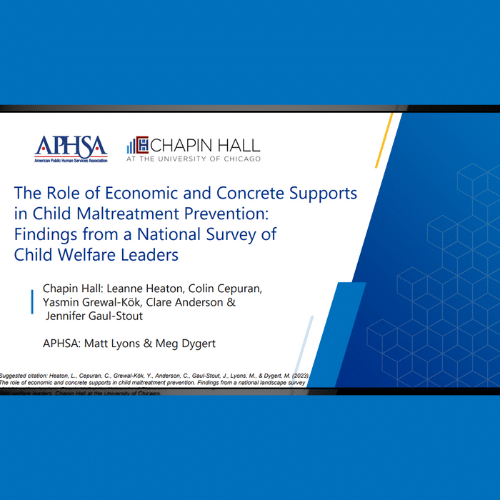Written By: Meg Dygert, Senior Policy Associate, Child & Family Well-Being, APHSA

In 2020, APHSA and Chapin Hall embarked on a groundbreaking partnership aimed at transforming the child welfare system. The collaboration was part of the larger Advancing Family Economic Mobility (AFEM) initiative funded by the W.K. Kellogg Foundation and the Doris Duke Foundation, which sought to create sustainable pathways to economic mobility and well-being for all people and families.
By focusing on prevention and family well-being, APHSA and Chapin Hall wanted to address the root causes of child welfare involvement, particularly those stemming from economic hardship. As an APHSA staff member involved in this initiative, I witnessed firsthand the powerful impact of integrating economic and concrete supports (ECS) to strengthen families and prevent crises.
Limitations in the Traditional Child Welfare Approach
Both organizations held a deep understanding of the strengths and limitations embedded within the traditional approach to child welfare. The system has historically functioned as an emergency response mechanism—it’s the alarm button pressed to initiate intervention after a crisis has occurred. This reactive model can lead to family separation while failing to address underlying issues, such as poverty.
APHSA and Chapin Hall, have instead advocated for a proactive, multi-system strategy that involves various sectors that can provide families with upstream supports before challenges escalate. That approach means strengthening the dam that holds families together rather than waiting for cracks to then initiate action. Some of the sectors that need to be strengthened include child care, education, health care, and economic services. These can reduce the need for the involvement of the child welfare system and all that it implies.
Lived Experience & Administrative Insights in the Use of Economic and Concrete Supports

Research clearly shows that providing families with ECS can significantly reduce the risk of child maltreatment and the need for more costly child protective services intervention. The use of tax credits, housing assistance, child care subsidies, direct cash transfers, and other supports alleviate financial stressors that often contribute to family crises, thereby promoting stability and well-being.
Understanding this data-driven insight is step one. The goal is to apply that realization in the work of supporting families. To begin, we wanted to ensure that recommended policies and strategies reflect the real-world experiences of families and the perspectives of key stakeholders.
APHSA and Chapin Hall conducted a series of focus groups that tested the role of ECS in child welfare prevention:
• People with Lived Experience (PWLE): We gathered reflections and reactions from individuals with direct experience navigating child welfare and economic support systems. Their feedback helped refine the approach to integrating ECS as a prevention strategy.
• TANF Administrators: We engaged state Temporary Assistance for Needy Families (TANF) leaders to understand how economic supports are currently being utilized. The hope is to identify opportunities for greater alignment between TANF and child welfare.
These focus groups were critical in shaping actionable recommendations and ensuring that policies are both effective and fairly applied.
Key Initiatives & Milestones
Since the start of APHSA’s partnership with Chapin Hall, we have undertaken several initiatives to promote the integration of ECS into child welfare prevention strategies. They include the following:
• 2022: Began supporting a national learning community focused on preventing family involvement in child welfare systems through ECS.
• June 2023: Published the Evidence to Impact policy tool, offering state policy options to increase access to ECS as a prevention strategy.
• July 2023: Launched a National ECS Cross-Sector Community of Practice to facilitate collaboration among local and state leaders.

• November 2023: Chapin Hall and APHSA release The Role of ECS in Child Maltreatment Prevention: Findings from a National Landscape Survey of Child Welfare Leaders, the first national survey of its kind.
• April 2024: Hosted Breaking the Link – Disrupting the Connection between Poverty and Child Welfare Involvement, a two-day national convening focused on innovative approaches to reducing child welfare involvement.
Moving Forward with a Vision for Change
APHSA and Chapin Hall continue to champion a shift from reactive interventions to proactive, preventive measures that address the economic challenges that families face. By fostering cross-sector collaboration and integrating ECS into prevention strategies, we aim to build a child welfare system that prioritizes family integrity, fairness, and well-being.
The insights gained from lived experience leaders and TANF administrators will inform future policy recommendations, ensuring that economic supports are maximized as a tool to strengthen families and prevent unnecessary child welfare involvement.
Personally, one of the most rewarding parts of our collaboration with Chapin Hall has been working on our shared commitment to centering families and grounding policy in lived experience. Together, we’ve worked to show that economic and concrete supports aren’t just helpful—they’re essential prevention tools.
For more information on the coordinated efforts of APHSA and Chapin Hall, as well as the policy recommendations that have come from it, refer to their January 2025 policy brief.
About the Author

Senior Policy Associate, Child & Family Well-Being
Share this post on your social media accounts